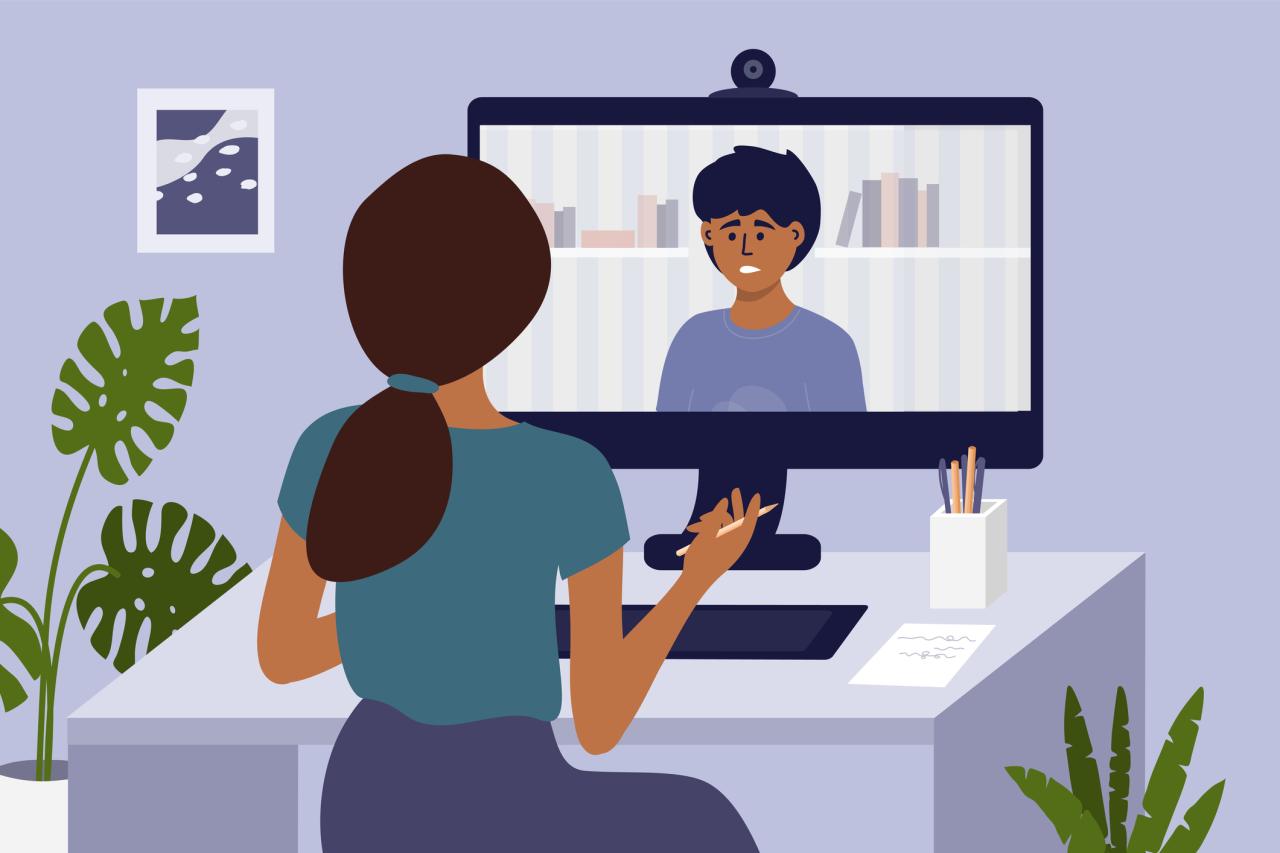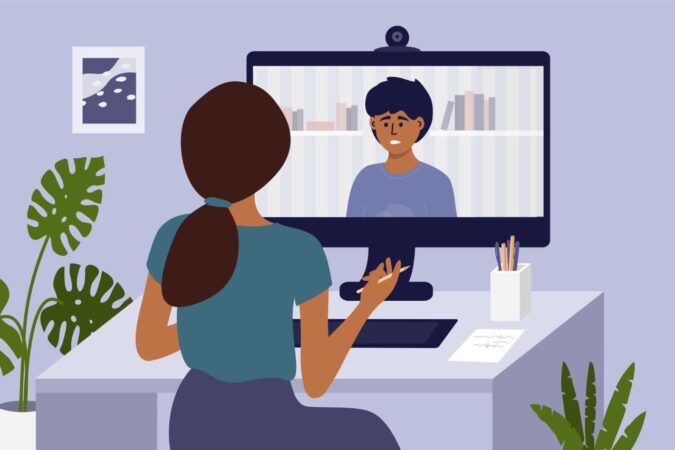
Understanding Online Mental Health Counseling
Online mental health counseling, also known as teletherapy or e-therapy, is a form of therapy that takes place over the internet using video conferencing, phone calls, or instant messaging.
It differs from traditional in-person therapy in that it allows clients to access therapy from the comfort of their own homes or anywhere with an internet connection. This can be especially beneficial for individuals who face barriers to traditional therapy, such as transportation issues, time constraints, or social anxiety.
Advantages of Online Counseling
- Convenience: Online counseling offers flexibility and convenience, allowing clients to schedule appointments at times that fit their schedules and without the need to travel.
- Accessibility: It provides access to therapy for individuals in remote areas or with mobility limitations who may not otherwise have access to in-person services.
- Reduced Stigma: Some clients may feel more comfortable seeking help online due to reduced social stigma associated with accessing mental health services.
Disadvantages of Online Counseling
- Technical Issues: Internet connectivity issues or technical difficulties can disrupt sessions or impact the quality of communication.
- Lack of Physical Presence: Online counseling lacks the physical presence of the therapist, which can affect the therapeutic relationship and the ability to provide certain interventions.
- Insurance Coverage: Insurance coverage for online counseling may vary depending on the provider and plan, and clients should check with their insurance company before seeking services.
Types of Online Mental Health Counseling
Online mental health counseling offers a wide range of specialized services tailored to diverse mental health needs. These services encompass various counseling approaches and utilize different platforms and technologies to facilitate virtual therapy sessions.
Common types of online counseling include:
- Individual therapy: One-on-one sessions between a licensed therapist and a client, addressing personal challenges, mental health concerns, and emotional well-being.
- Group therapy: Facilitated discussions among a small group of individuals with similar experiences or goals, providing support, shared insights, and a sense of community.
- Couples therapy: Counseling sessions designed for couples facing relationship challenges, communication issues, or marital difficulties.
- Family therapy: Involving multiple family members, this type of counseling aims to improve family dynamics, resolve conflicts, and enhance communication within the family unit.
- Crisis counseling: Immediate and short-term support for individuals experiencing acute mental health crises, such as suicidal thoughts, self-harm, or trauma.
Approaches Used in Online Therapy
Online therapy utilizes various therapeutic approaches to address mental health concerns. Some commonly employed approaches include:
- Cognitive Behavioral Therapy (CBT): Focuses on identifying and changing negative thought patterns and behaviors that contribute to mental health issues.
- Dialectical Behavior Therapy (DBT): A skills-based approach that teaches individuals to regulate emotions, manage interpersonal relationships, and tolerate distress.
- Humanistic Therapy: Emphasizes the client’s innate potential for growth and self-actualization, fostering a supportive and empathetic therapeutic environment.
- Psychodynamic Therapy: Explores unconscious conflicts and patterns from the past that may be influencing current mental health concerns.
- Solution-Focused Therapy: Goal-oriented approach that focuses on identifying and implementing solutions to specific problems rather than dwelling on the past.
Platforms and Technologies for Online Counseling
Online counseling is conducted through various platforms and technologies that facilitate virtual communication and support. These include:
- Video conferencing: Real-time video calls allow therapists and clients to interact face-to-face, providing a more personal and engaging experience.
- Text-based platforms: Secure messaging apps and email exchanges enable asynchronous communication, allowing clients to express their thoughts and receive feedback at their own pace.
- Virtual reality (VR) and augmented reality (AR): Immersive technologies used to create realistic and interactive therapeutic environments.
- Artificial intelligence (AI)-powered chatbots: Automated tools that provide initial screening, self-help resources, and support between therapy sessions.
How Online Mental Health Counseling Works
Online mental health counseling is a convenient and effective way to receive mental health care from the comfort of your own home. The process of finding an online therapist is similar to finding a therapist in person. You can search online directories, ask for referrals from friends or family, or contact your insurance company.
Once you have found a therapist, you will typically have an initial consultation to discuss your needs and goals. This consultation can be done over the phone, video chat, or email. After the initial consultation, you will typically have regular therapy sessions with your therapist. These sessions can be scheduled weekly, bi-weekly, or monthly, depending on your needs.
Online therapy sessions are typically conducted over video chat or email. Video chat allows you to see and hear your therapist in real time, while email allows you to communicate with your therapist at your own pace. Both video chat and email can be effective ways to receive therapy.
There are several challenges and opportunities to online counseling. One challenge is that it can be difficult to build a strong rapport with your therapist over video chat or email. However, many people find that they are able to build a strong relationship with their therapist online. Another challenge is that online therapy can be less personal than in-person therapy. However, online therapy can also be more convenient and affordable than in-person therapy.
Overall, online mental health counseling is a convenient and effective way to receive mental health care. It is important to find a therapist who you feel comfortable with and who can meet your needs.
Effectiveness of Online Mental Health Counseling
Research consistently demonstrates the effectiveness of online mental health counseling. Studies have shown that it can be just as effective as in-person therapy in treating a wide range of mental health conditions, including depression, anxiety, and post-traumatic stress disorder (PTSD).
In fact, some studies have even found that online therapy may be more effective than in-person therapy for certain conditions. For example, one study found that online cognitive-behavioral therapy (CBT) was more effective than in-person CBT for treating social anxiety disorder.
Factors Contributing to Success
Several factors contribute to the success of online counseling, including:
- Accessibility: Online counseling is more accessible than in-person therapy, as it can be accessed from anywhere with an internet connection. This can be especially beneficial for people who live in rural areas or who have difficulty traveling to a therapist’s office.
- Convenience: Online counseling is also more convenient than in-person therapy, as it can be scheduled at a time that is convenient for the client. This can be especially beneficial for people who have busy schedules or who have difficulty taking time off work.
- Affordability: Online counseling is often more affordable than in-person therapy, as it does not require the therapist to travel to the client’s home or office.
- Anonymity: Online counseling can provide a sense of anonymity, which can be beneficial for people who are uncomfortable discussing their mental health issues in person.
Ethical Considerations in Online Mental Health Counseling
Online mental health counseling, while offering many benefits, presents unique ethical considerations that must be addressed to ensure the well-being of clients and the integrity of the profession. Ethical guidelines, confidentiality, privacy, legal and regulatory issues must be carefully navigated to provide ethical and effective online therapy.
Ethical Guidelines for Online Counseling
Professional organizations such as the American Psychological Association (APA) have established ethical guidelines for online counseling, emphasizing informed consent, confidentiality, and competence. Counselors must disclose the limitations and benefits of online therapy, obtain informed consent from clients, and maintain appropriate boundaries in online interactions.
Confidentiality and Privacy in Online Therapy
Confidentiality is paramount in mental health counseling, and online therapy poses challenges in maintaining it. Counselors must implement secure communication channels, protect client data, and be mindful of potential breaches. Clients should be informed about the privacy policies and measures taken to safeguard their information.
Legal and Regulatory Issues Related to Online Counseling
Online counseling raises legal and regulatory issues, including licensure requirements, cross-jurisdictional practice, and liability. Counselors must be licensed in the state where their clients reside and adhere to the laws and regulations governing telehealth services. Cross-jurisdictional practice requires careful consideration of legal and ethical implications.
Future of Online Mental Health Counseling

Online mental health counseling has witnessed remarkable growth in recent years and is poised for further advancements. With the rapid evolution of technology, the future of online therapy holds promising prospects for improving mental health care accessibility and effectiveness.
Emerging Trends in Online Counseling
Several emerging trends are shaping the future of online counseling:
- Virtual reality (VR) and augmented reality (AR): These technologies offer immersive experiences that enhance engagement and create a more realistic therapeutic environment.
- Artificial intelligence (AI): AI-powered chatbots and virtual therapists provide accessible and cost-effective support for mild to moderate mental health concerns.
- Wearable technology: Devices like smartwatches and fitness trackers monitor mental health indicators, enabling personalized interventions and early detection of distress.
- Telepsychiatry: Online platforms facilitate remote consultations with psychiatrists for medication management and more complex mental health issues.
Technology’s Role in Shaping the Future of Online Therapy
Technology is playing a pivotal role in shaping the future of online counseling:
- Increased accessibility: Online platforms remove geographical barriers and provide access to therapy for individuals in remote or underserved areas.
- Reduced stigma: The anonymity and convenience of online counseling reduce the stigma associated with seeking mental health support.
- Personalized interventions: Data analytics and AI algorithms enable tailored treatment plans based on individual needs and preferences.
- Improved outcomes: Studies have shown that online therapy can be equally effective as in-person therapy for various mental health conditions.
Future of Online Counseling and Its Impact on Mental Health Care
The future of online counseling holds significant implications for mental health care:
- Expanded access to care: Online therapy will continue to bridge the gap in mental health care access, particularly for marginalized populations.
- Reduced costs: Virtual platforms and AI-powered solutions can reduce the cost of therapy, making it more affordable for individuals.
- Improved quality of care: Technological advancements will enhance the quality of online therapy, providing more engaging and effective interventions.
- Integration with traditional care: Online counseling will increasingly complement traditional in-person therapy, offering a blended approach to mental health care.





